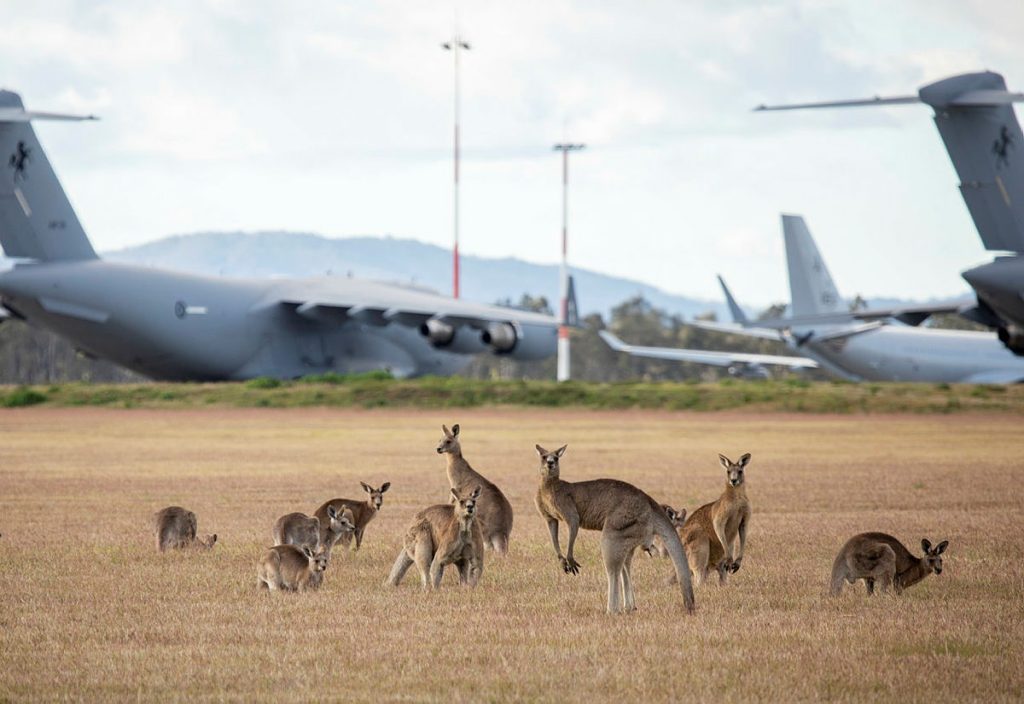The five-domains update

Sea state
Two Chinese surveillance ships are stationed off Queensland’s coast to observe the massive 2021 Talisman Sabre exercise. The fortnight-long exercise is led by Australia and the US, which have been joined by other Five Eyes nations and South Korea and Japan. Official observers include France, Germany, India and Indonesia. This year more than 17,000 personnel will practise joint force cooperation in amphibious assaults. Australian National University adjunct professor James Goldrick considers China’s surveillance the ‘new normal’, particularly as the exercise includes the ‘most sophisticated periphery powers to its First Island Chain.’
Victoria’s HMAS Cerberus naval base has been locked down after a fully vaccinated navy member tested positive for the highly infectious Covid-19 Delta variant on his return to the base from Melbourne. Training has been suspended and 18 close contacts are awaiting test results. Over 40% of Australian Defence Force personnel are fully vaccinated, but the rate is much higher at HMAS Cerberus, where around 80% of permanent staff have had the jab.
Flight path
Amid rising tensions with China, the United States Air Force will deploy more than 35 aircraft and 800 personnel to the Western Pacific islands of Guam and Tinian for this month’s Pacific Iron 2021 exercise. The force includes two C-130J Hercules transports, 10 F-15 Strike Eagles and approximately 25 F-22 Raptors—the largest group of the stealthy fighters ever deployed in the Pacific. The exercise aims to prepare the US Pacific Air Forces for ‘agile’ operations from smaller, underdeveloped airfields in case major regional air bases are rendered inoperable during wartime.
The global race for lethal technology continues with the US testing a warhead for the air force’s prototype hypersonic glide missile, Russia reporting a successful test-firing of its Tsirkon hypersonic cruise missile, Britain’s Royal Navy announcing a suite of new surface-to-air missiles, and the Royal Air Force releasing an ambitious vision for ‘swarming drone’ capabilities built on the success of its drone test squadron.
Rapid fire
Lebanon’s financial crisis is pushing its armed forces’ salaries below the poverty line, and senior military officials want an additional US$100 million to cover basic needs. Once regarded as the jewel of the Middle East, Lebanon has seen the value of its currency plummet by 90% and food prices have inflated by 400%. The army is regarded by many as the last institution securing the nation following mass government resignations. The US contributed US$120 million in financial assistance to the Lebanese Armed Forces in May and sees them as an important ally in regional counterterrorism cooperation.
Classified details of the UK’s Challenger 2 battle tank have been leaked online by a player of a popular combat video game, ‘War Thunder’. The player, who claimed to have been a British Army tank instructor, uploaded a manual known as an ‘Army equipment support publication’ after he disputed the accuracy of the tank design used in the game. The game developer, Gaijin Entertainment, is a Moscow-founded company that has previously collaborated with the Russian Ministry of Defence, raising concerns about who now has the document.
Final frontier
Britain’s Royal Air Force intends to build a space ground station to observe China’s and Russia’s testing of anti-satellite weapons. Working in tandem with similar bases in Australia and the US, the facility will identify satellite system threats, including space debris and incoming missiles, and, says the RAF, ‘add capabilities other allies don’t have’. China’s and Russia’s anti-satellite technology is raising concerns in the US, the UK, India and Japan that space is becoming a weaponised domain and that rules for space behaviour are needed urgently.
Billionaires Richard Branson and Jeff Bezos have each travelled to, or near, space aboard their Virgin Galactic and Blue Origin craft, marking a new era of commercial space tourism and reigniting concerns about the need to more rigorously regulate commercial space travel. The Federal Aviation Administration regulates US commercial spacecraft, but Congress has imposed a regulations moratorium until 2023 to foster innovation. That has raised concerns that the government’s ability to mitigate the risks from commercial spacecraft to public safety, environment and space traffic has been lost as the industry develops.
Wired watchtower
The Australian government has assembled a cross-agency taskforce to disrupt ransomware attacks linked to offshore criminal groups. This centralised Australian Federal Police–led Operation Orcus includes cybersecurity and intelligence agencies. Over the past year, several Australian organisations have been targeted in ransomware attacks, and the government has faced severe criticism over the apparent lack of effective mechanisms to stop or apprehend groups carrying out attacks. Companies targeted by ransomware attacks say they lack guidance on how to deal with them.
Human rights groups and media organisations have alleged that more than 50 governments have used military-grade spyware to target over 50,000 mobile phones owned by journalists, human rights activists and politicians, posing serious threats to political and press freedoms. It’s alleged the spyware produced by the Israel-based NSO Group was used to hack these phones. NSO has strongly denied the allegations and has vowed to investigate.